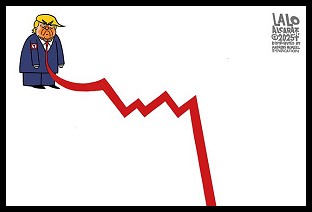 Today, democracy in Pennsylvania was granted a reprieve. For now. Of a sort.
Today, democracy in Pennsylvania was granted a reprieve. For now. Of a sort.
In response to a recent state Supreme Court remand, unanimously voiding his previous August ruling, Commonwealth Court Judge Robert Simpson, a Republican, issued his new ruling [PDF] today on the state GOP's polling place Photo ID restriction law.
He enjoined just a part of the law, but it effectively strikes down the most onerous provision of it --- but only for this November's Presidential election. There were also a number of troubling caveats with what he left in place, rather than striking down the entire statute as the petitioners had sought.
There has been some confused and confusing reporting on the ruling today. Here is where --- barring any additional court challenges --- the law stands at this moment, just over one month from Election Day...
- Voters will NOT have to show a state-issued Photo ID at the polling place in order to cast a normal ballot.
- Poll workers SHALL ask voters for Photo ID, but they may NOT keep them from voting if they do not have one.
- Voters will NOT have to cast a provisional ballot if they do not have state-issued Photo ID.
Hopefully that clarifies the key points of today's ruling, which is being misreported in some quarters.
Also of note, the court refused to enjoin the Commonwealth's tax-payer funded $5 million ad campaign, as written into the statute for the purposes of "educating" the public about the polling place Photo ID requirement (even though it no longer practically applies for this election.)
Given that, and given that poll workers may still ask for ID this November, and given that the Photo ID requirements, barring more legal challenges, will be allowed to take effect next year, it is almost guaranteed that confusion will reign in parts of Pennsylvania this year. On the upside, the 1.6 million otherwise-eligible voters who it was feared could be disenfranchised, will at least be allowed to vote in this year's Presidential election, presuming they can navigate all of the confusion left in place by Judge Simpson.
Contrary to the claim made by GOP "voter fraud" fraudster, Hans Van Spakovsky, the court did not rule on the constitutionality of PA's Photo ID statute. A ruling on that aspect of the law will not be made until after the case proceeds to a trial, following the election, on the plaintiff's request for a permanent injunction.
Tonight, MSNBC's Rachel Maddow also discussed the confusion likely to be brought by the state's continuing ad campaign along with the other vagueries allowed to continue by Judge Simpson's ruling today...


 Trump EPA Guts Enviro Justice Office: 'BradCast' 4/24/25
Trump EPA Guts Enviro Justice Office: 'BradCast' 4/24/25 'Green News Report' 4/24/25
'Green News Report' 4/24/25
 Nation's Largest Broadcaster Mandates News Outlets Hoax Viewers to Help Gut FCC Rules: 'BradCast' 4/23/25
Nation's Largest Broadcaster Mandates News Outlets Hoax Viewers to Help Gut FCC Rules: 'BradCast' 4/23/25 Trump's FCC on Precipice of Ending All Limits on Corporate Control of Local TV Stations
Trump's FCC on Precipice of Ending All Limits on Corporate Control of Local TV Stations GOP Earth Day 2025 Hypocrisies and Dilemmas: 'BradCast' 4/22/25
GOP Earth Day 2025 Hypocrisies and Dilemmas: 'BradCast' 4/22/25 'Green News Report' 4/22/25
'Green News Report' 4/22/25 Pope Francis Dies,
Pope Francis Dies, Sunday
Sunday  Sunday 'Zero Day' Toons
Sunday 'Zero Day' Toons Soc. Sec. Expert Warns DOGE Hastening Collapse, Privati-zation: 'BradCast' 4/10/2025
Soc. Sec. Expert Warns DOGE Hastening Collapse, Privati-zation: 'BradCast' 4/10/2025 'Green News Report' 4/10/25
'Green News Report' 4/10/25 Trump Blinks, Chaos Reigns, Markets Spike as Many Tariffs Remain Despite 90-Day 'Pause': 'BradCast' 4/9/25
Trump Blinks, Chaos Reigns, Markets Spike as Many Tariffs Remain Despite 90-Day 'Pause': 'BradCast' 4/9/25 SCOTUS Deportation Ruling Grimmer Than First Appears: 'BradCast' 4/8/25
SCOTUS Deportation Ruling Grimmer Than First Appears: 'BradCast' 4/8/25 'Green News Report' 4/8/25
'Green News Report' 4/8/25 Cliff Diving with Donald: 'BradCast' 4/7/25
Cliff Diving with Donald: 'BradCast' 4/7/25 Sunday 'Don't Look Down' Toons
Sunday 'Don't Look Down' Toons 'Green News Report' 4/3/25
'Green News Report' 4/3/25 'Mob Boss' Trump's Trade Sanctions Tank U.S., World Markets: 'BradCast' 4/3/25
'Mob Boss' Trump's Trade Sanctions Tank U.S., World Markets: 'BradCast' 4/3/25 Crawford Landslide in WI; Booker Makes History in U.S. Senate: 'BradCast' 4/2/25
Crawford Landslide in WI; Booker Makes History in U.S. Senate: 'BradCast' 4/2/25 Judge Ends Challenge to GA's Unverifiable, Insecure Vote System: 'BradCast' 4/1/25
Judge Ends Challenge to GA's Unverifiable, Insecure Vote System: 'BradCast' 4/1/25 Bad Court, Election News for Trump is Good News for U.S.: 'BradCast' 3/31
Bad Court, Election News for Trump is Good News for U.S.: 'BradCast' 3/31 Vets Push Back at Plan to Slash Health Care, 80K V.A. Jobs: 'BradCast' 3/27/25
Vets Push Back at Plan to Slash Health Care, 80K V.A. Jobs: 'BradCast' 3/27/25 Signal Scandal Worsens for Trump, GOP; Big Dem Election Wins in PA: 'BradCast' 3/26
Signal Scandal Worsens for Trump, GOP; Big Dem Election Wins in PA: 'BradCast' 3/26 'Emptywheel': Trump NatSec Team Should 'Resign in Disgrace': 'BradCast' 3/25/25
'Emptywheel': Trump NatSec Team Should 'Resign in Disgrace': 'BradCast' 3/25/25 USPS 'Belongs to the People, Not the Billionaires': 'BradCast' 3/24/25
USPS 'Belongs to the People, Not the Billionaires': 'BradCast' 3/24/25
 VA GOP VOTER REG FRAUDSTER OFF HOOK
VA GOP VOTER REG FRAUDSTER OFF HOOK Criminal GOP Voter Registration Fraud Probe Expanding in VA
Criminal GOP Voter Registration Fraud Probe Expanding in VA DOJ PROBE SOUGHT AFTER VA ARREST
DOJ PROBE SOUGHT AFTER VA ARREST Arrest in VA: GOP Voter Reg Scandal Widens
Arrest in VA: GOP Voter Reg Scandal Widens ALL TOGETHER: ROVE, SPROUL, KOCHS, RNC
ALL TOGETHER: ROVE, SPROUL, KOCHS, RNC LATimes: RNC's 'Fired' Sproul Working for Repubs in 'as Many as 30 States'
LATimes: RNC's 'Fired' Sproul Working for Repubs in 'as Many as 30 States' 'Fired' Sproul Group 'Cloned', Still Working for Republicans in At Least 10 States
'Fired' Sproul Group 'Cloned', Still Working for Republicans in At Least 10 States FINALLY: FOX ON GOP REG FRAUD SCANDAL
FINALLY: FOX ON GOP REG FRAUD SCANDAL COLORADO FOLLOWS FLORIDA WITH GOP CRIMINAL INVESTIGATION
COLORADO FOLLOWS FLORIDA WITH GOP CRIMINAL INVESTIGATION CRIMINAL PROBE LAUNCHED INTO GOP VOTER REGISTRATION FRAUD SCANDAL IN FL
CRIMINAL PROBE LAUNCHED INTO GOP VOTER REGISTRATION FRAUD SCANDAL IN FL Brad Breaks PA Photo ID & GOP Registration Fraud Scandal News on Hartmann TV
Brad Breaks PA Photo ID & GOP Registration Fraud Scandal News on Hartmann TV  CAUGHT ON TAPE: COORDINATED NATIONWIDE GOP VOTER REG SCAM
CAUGHT ON TAPE: COORDINATED NATIONWIDE GOP VOTER REG SCAM CRIMINAL ELECTION FRAUD COMPLAINT FILED AGAINST GOP 'FRAUD' FIRM
CRIMINAL ELECTION FRAUD COMPLAINT FILED AGAINST GOP 'FRAUD' FIRM RICK SCOTT GETS ROLLED IN GOP REGISTRATION FRAUD SCANDAL
RICK SCOTT GETS ROLLED IN GOP REGISTRATION FRAUD SCANDAL VIDEO: Brad Breaks GOP Reg Fraud Scandal on Hartmann TV
VIDEO: Brad Breaks GOP Reg Fraud Scandal on Hartmann TV RNC FIRES NATIONAL VOTER REGISTRATION FIRM FOR FRAUD
RNC FIRES NATIONAL VOTER REGISTRATION FIRM FOR FRAUD EXCLUSIVE: Intvw w/ FL Official Who First Discovered GOP Reg Fraud
EXCLUSIVE: Intvw w/ FL Official Who First Discovered GOP Reg Fraud GOP REGISTRATION FRAUD FOUND IN FL
GOP REGISTRATION FRAUD FOUND IN FL



















 From Palm Beach to Richmond, from Las Vegas to Portland, it's not a coincidence, it's a coordinated GOP scheme intended to keep Obama supporters from signing up to vote.
From Palm Beach to Richmond, from Las Vegas to Portland, it's not a coincidence, it's a coordinated GOP scheme intended to keep Obama supporters from signing up to vote. A Pennsylvania Commonwealth Court judge may be on the verge of "splitting the baby" in his latest ruling on the challenge to the state Republicans' polling place Photo ID law, despite a clear mandate from the state Supreme Court ordering him to either find the new law will not disenfranchise any voters this year, or block it entirely with an injunction.
A Pennsylvania Commonwealth Court judge may be on the verge of "splitting the baby" in his latest ruling on the challenge to the state Republicans' polling place Photo ID law, despite a clear mandate from the state Supreme Court ordering him to either find the new law will not disenfranchise any voters this year, or block it entirely with an injunction. The Republican Party of Florida's top recipient of 2012 expenditures, a firm by the name of Strategic Allied Consulting, was just fired on Tuesday night, after more than 100 apparently fraudulent voter registration forms were discovered to have been turned in by the group to the Palm Beach County, FL Supervisor of Elections.
The Republican Party of Florida's top recipient of 2012 expenditures, a firm by the name of Strategic Allied Consulting, was just fired on Tuesday night, after more than 100 apparently fraudulent voter registration forms were discovered to have been turned in by the group to the Palm Beach County, FL Supervisor of Elections. According to a new poll out today, voters in Minnesota may be getting wise to the state Republicans' scheme to suppress the votes of minorities, the elderly, students and the poor, all of whom have the annoying habit of voting in favor of Democrats.
According to a new poll out today, voters in Minnesota may be getting wise to the state Republicans' scheme to suppress the votes of minorities, the elderly, students and the poor, all of whom have the annoying habit of voting in favor of Democrats.
 Meanwhile, as the War Over Which Americans Get to Exercise Their Right to Vote rages on, concern about how the votes of those who do get to vote, will (or won't) be tabulated, goes largely unnoticed. Again.
Meanwhile, as the War Over Which Americans Get to Exercise Their Right to Vote rages on, concern about how the votes of those who do get to vote, will (or won't) be tabulated, goes largely unnoticed. Again. The Pennsylvania Supreme Court, in a 4 to 2 decision this afternoon, has vacated a Commonwealth Court's earlier ruling, which had denied a temporary injunction on the state GOP's polling place Photo ID restriction law. Rather than issuing their own injunction, they have has sent the matter back to the lower court for review.
The Pennsylvania Supreme Court, in a 4 to 2 decision this afternoon, has vacated a Commonwealth Court's earlier ruling, which had denied a temporary injunction on the state GOP's polling place Photo ID restriction law. Rather than issuing their own injunction, they have has sent the matter back to the lower court for review. We're back guest hosting the nationally-syndicated
We're back guest hosting the nationally-syndicated  There are so many terrible, voter-suppressing Secretaries of State at work this year, actively trying to undermine democracy in the U.S. on behalf of the Republican Party, it's been difficult to adequately cover them all. One who has largely managed to escape our wrath on these pages --- thanks to his horrible colleagues in places like
There are so many terrible, voter-suppressing Secretaries of State at work this year, actively trying to undermine democracy in the U.S. on behalf of the Republican Party, it's been difficult to adequately cover them all. One who has largely managed to escape our wrath on these pages --- thanks to his horrible colleagues in places like  Chalk up another blow to transparency and an informed electorate, and another judicial victory for the democratic perversion known as corporate "free speech."
Chalk up another blow to transparency and an informed electorate, and another judicial victory for the democratic perversion known as corporate "free speech."













